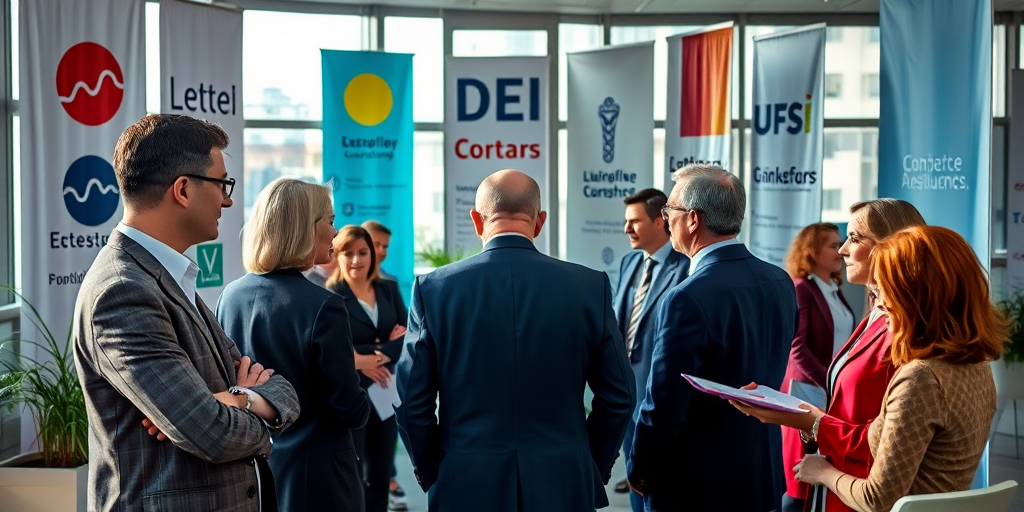How Trump’s Anti-Woke Push Affects German Firms’ DEI Policy
The recent trend inspired by Donald Trump’s anti-woke policies is causing ripples beyond the United States and now has significant implications for German firms’ Diversity, Equity, and Inclusion (DEI) policies. As some major U.S. corporations trim or completely abandon their DEI efforts, European companies are finding themselves under pressure to reassess their initiatives, particularly those with strong U.S. business ties.
The Shift in DEI Strategies Across the U.S.
In the aftermath of Trump’s policies, a noticeable shift has been observed in the corporate strategies of many influential U.S. enterprises. Companies such as Meta, Alphabet, Ford, and Starbucks have either scaled back or entirely scrapped their DEI programs. This trend, sparked by executive orders from Trump’s administration deeming DEI programs potentially unconstitutional and discriminatory, has raised concerns about potential increases in workplace discrimination and anxiety among minority groups.
Despite the rollback by these companies, a significant portion of the corporate sector in the U.S. remains committed to DEI. Approximately 75% of companies, including tech giants like Apple and Microsoft, as well as Costco, continue to endorse diversity in the workplace, viewing it as a core strength.
German Companies Under Pressure
This shift has also been felt across the Atlantic in Europe. Companies connected to the U.S. are being asked to confirm via questionnaires that they no longer support DEI initiatives, prompting a reaction from several German firms. Notably, Volkswagen and Deutsche Telekom have announced plans to reduce or phase out their DEI programs in the U.S., fearing loss of government contracts or encountering regulatory obstacles in case of mergers if they maintain support for DEI.
However, a survey conducted by Charta der Vielfalt, Germany’s largest employer initiative committed to DEI, shows a different picture. Among the 100 companies polled, 90% expressed their intention to continue DEI programs as usual. The survey indicates a robust commitment to diversity within German corporations despite external political pressures.
Cawa Younosi, managing director of Charta der Vielfalt, expressed optimism, saying, “If you look beyond the big names, there’s a ‘now more than ever’ attitude in Germany.”
Defiant Stance by Some German Firms
While certain corporations are re-evaluating their DEI commitments, others are maintaining a strong stance in support of their diversity goals. BMW and Henkel are closely monitoring the evolving situation but have yet to make drastic changes. Siemens and Lush have defiantly maintained that DEI is integral to their corporate identity. “Lush is not bowing to this pressure; DEI is at the core of our corporate identity,” a company representative asserted.
Analysts have pointed out that while some corporations appear to be backing down, many are actually rebranding their DEI efforts to avoid legal ramifications. Michelle Jolivet, an expert on corporate diversity, explains, “Instead of dismantling programs outright, companies are often rebranding and reorganizing to steer clear of potential lawsuits.”
Local Impact and Community Interest
For local communities, particularly in regions with high German corporate presence, the potential downsizing or withdrawal of DEI initiatives could have implications. It may affect community partnerships, sponsorships, and diversity-focused programs supported by these companies. Residents concerned about maintaining an inclusive work environment might feel the broader impact of such policy changes, underscoring the significance of DEI for social cohesion and economic growth.
In the U.S., where DEI programs gained momentum especially after the Black Lives Matter protests, community leaders express concern over the impact of reduced corporate diversity efforts. Notably, community figures and officials are emphasizing the need for sustained dialogue and engagement to ensure that diversity continues to thrive at both the corporate and community levels.
Potential Future Implications
Looking ahead, the interplay between political forces and corporate policies will continue to shape DEI strategies worldwide. There is a chance that if these anti-DEI trends persist, other companies might follow suit, potentially stalling progress made in promoting inclusive workplaces.
However, the resilience shown by numerous companies in Germany and the U.S. signals a commitment to maintaining diversity, even amidst political challenges. For local stakeholders, the determination to champion DEI issues and counteract discriminatory practices will remain a crucial factor in driving societal advancement.
As the situation evolves, relevant local resources such as diversity-focused nonprofits and advocacy groups can serve as valuable platforms for community engagement and empowerment, ensuring that efforts toward a more equitable workplace and society do not falter.
Ultimately, how this scenario unfolds will depend on the ability of corporations and communities to navigate the fluctuating landscape, advocating for policies that not only preserve but enhance DEI objectives, fostering a culture of inclusivity for all.







